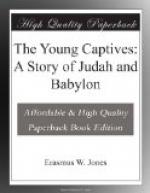Cyrus, whom divine Providence was to make use of, was mentioned in the Scriptures by his name one hundred and fifty years before he was born in these words:
“Thus saith the Lord to his anointed, to Cyrus, whose right hand I have holden, to subdue nations before him; and I will loose the loins of kings, to open before him the two-leaved gates; and the gates shall not be shut. I will go before thee and make the crooked places straight; I will break in pieces the gates of brass, and cut in sunder the bars of iron; and I will give thee the treasures of darkness and hidden riches of secret places; that thou mayest know that I, the Lord, which call thee by thy name, am the God of Israel. For Jacob my servant’s sake, and Israel mine elect, I have even called thee by thy name: I have surnamed thee, though thou hast not known me” (Isa. 45: 1-4).
CHAPTER XXII.
The army of Cyrus had already reached the capital of Chaldea. The vast plain before the city swarmed with moving thousands of Medes and Persians. At this time no warriors were finer in appearance than the battlemen of the Persian prince. Their discipline had reached to an almost inconceivable degree of perfection. The wishes and desires of their great commander had become their law; and each one vied with the other in rendering obedience to his orders. Their fame had spread throughout lower Asia, and through many parts of Assyria.
But the Babylonians thought themselves so well prepared for this emergency that the numerous legions of Cyrus failed to alarm them. Their walls they considered proof against any attack, and they had a sufficient amount of provision in the city for twenty years. They laughed to scorn the demand of the Persians, and loudly ridiculed them from the city walls. Belshazzar and his counselors, considering themselves secure, gave way to their depraved appetites. The palace was one scene of debauchery and revelry by day and by night.
The Persian general soon saw that an assault on such formidable defenses would be useless. A project was conceived in his mind. He made the inhabitants believe that he intended to reduce the city by famine. To this end he caused a line of circumvallation to be drawn quite around the city with a large and deep ditch; and, that his troops might not be over-fatigued, he divided his army into twelve bodies, and assigned to each of them its month of guarding the trenches. The great ditch was completed, but the reveling Babylonians little thought of its real design.
Belshazzar, the king, made a feast to a thousand of his lords, and drank wine before the thousand. This feast was one of great splendor. The most spacious and magnificent rooms in the richest city in the world were crowded with rank and beauty. Learning, aristocracy and royalty were there. Precious stones and costly perfumery filled the salon with dazzling luster and sweet fragrance. Wit




